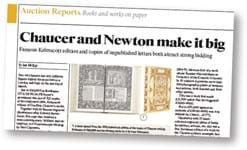An American collector consigned what he believed to be a valuable work to auction in England, at one of the major auction houses.
The work didn’t fly quite like he had expected, but he was content nevertheless.
In due time payment was received in the usual way.
He continued buying and selling, and consigning to auction as he had done for many years in the genres that interested him.
A few months after payment was received from the sale he noticed the work which had sold appearing once again on the auction house’s website.
He thought this was rather curious and rather soon, but let it pass and forgot about it.
Curious coincidence
By chance he then had to speak to one of the auction house experts through whom he had made the original sale, as he was interested in purchasing another two works which were again within this expert’s remit.
While chatting he mentioned the curious coincidence of the work he had sold through them reappearing on the website just a few months later with a rather higher estimate than previously.
The response came back as follows.
The purchaser of the work, a Russian resident, had died very shortly after the auction. The auction house had tried through every means possible to contact the representatives of his estate but, despite all efforts there was no response at all, and they just gave up.
Realistically there was no chance of them getting payment and so they decided to pay out the American collector as a matter of goodwill, since he was a good client, in any event.
Bemused, the collector then moved on to discuss the works he was interested in now purchasing.
Very shortly afterwards the work which he had originally consigned for sale sold for over double the figure that had been achieved on the original sale for which he had now been paid out.
You will not be surprised to hear that the collector once again phoned his friend, the expert, with whom he was dealing at the auction house, somewhat disgruntled at this state of affairs.
The response was that as the auction house had paid him out, the work at that point was therefore owned by the auction house, and the profit made on the second sale belonged entirely to the auction house.
He turned over all these events in his mind and, discontented, came to see me.
Agent role
On hearing this tale I explained the following.
An auctioneer is first and foremost the agent of the consignor. In law, an agent has duties, much discussed in many cases, to his principal, ie in the case of an auction house, the consignor of the work.
To quote from one Judge:
“The law imposes on agents high standards. If you undertake to act for a man you must act … as if you were him. An undisclosed but realistic possibility of a conflict of interest is a breach of your duty of good faith to your client ….”
The lack of proper disclosure by the auction house was central here.
It should have informed the consignor about non-payment, and offered him the opportunity to decide whether he wanted to accept the funds from the auction house and let title pass to them, in the knowledge then that the auction house could re-offer it for sale itself.
If he didn’t wish to do that, then he should have been allowed to decide whether he wanted to take the work back, or reoffer it through the auction house himself, entirely at his discretion.
However, he was kept in the dark and was not aware of what was going on.
Insofar as the auction house hoped to make a profit for itself, and initially did so, there was a clear conflict of interest with its own client.
Phone chat
Rather than write a long legal letter on all this to the auction house I decided first to pick up the phone to try and speak to the expert involved, explain all this to him, and see if I could make some progress.
I was not that optimistic, however, since seven-figure sums were at stake.
Much to my surprise – and to the great credit of the auction house – the conversation went very well indeed, they saw the point entirely, and my client quite swiftly received the substantial extra profit that occurred on the second sale.
Not everything goes this well, but it is pleasing when it does.
Milton Silverman is senior commercial dispute resolution partner at Streathers Solicitors LLP, London.















